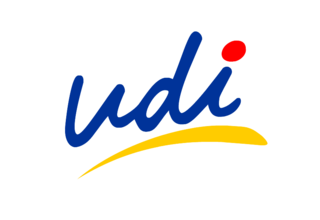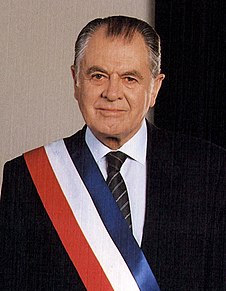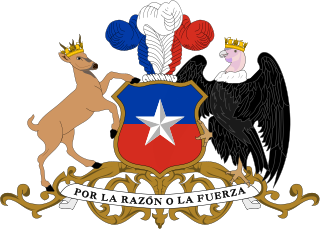
Marcos Orlando Letelier del Solar was a Chilean economist, politician and diplomat during the presidency of Salvador Allende. A refugee from the military dictatorship of General Augusto Pinochet, Letelier accepted several academic positions in Washington, D.C. following his exit from Chile. In 1976, agents of Dirección de Inteligencia Nacional (DINA), the Pinochet regime's secret police, assassinated Letelier in Washington via the use of a car bomb. These agents had been working in collaboration with members of the Coordination of United Revolutionary Organizations, a U.S.-sponsored, anti-Fidel Castro, militant group.

Salvador Guillermo Allende Gossens was a Chilean democratic socialist politician and physician, President of Chile from 1970 until 1973, and head of the Popular Unity political coalition government; he was the first ever Marxist to be elected president in a country with liberal democracy.

The Christian Democratic Party is a Christian democratic political party in Chile and governs as part of the Nueva Mayoría coalition.

The Socialist Party of Chile is a political party within the centre-left Nueva Mayoría. Its historic leader was President of Chile Salvador Allende, who was deposed in a coup d'état by General Pinochet in 1973. Twenty-seven years later, Ricardo Lagos Escobar represented the Socialist Party in the 1999 presidential elections. He won 48.0% in the first round of voting and was elected with 51.3% in the second round. In the legislative elections on 16 December 2001, as part of the Coalition of Parties for Democracy, the party won 10 out of 117 seats in the Chamber of Deputies and 5 out of 38 elected seats in the Senate. After the 2005 elections, the Party increased its seats to 15 and 8, respectively. In the 2009 elections, it retained 11 Congressional and 5 Senate seats.
Chile is a country in the southern South America. It borders the countries of Peru, Bolivia and Argentina, and is bordered by the Pacific Ocean. Chile became an independent state in 1810. United States intervention in Chilean politics started during the War of Chilean Independence. The influence of the United States of America in both the economic and the political arenas of Chile has gradually increased over the two centuries since, and continues to be significant.

The Independent Democratic Union is a Chilean right-wing, conservative political party, founded in 1983. Its founder was the lawyer, politician and law professor Jaime Guzmán, a civilian who collaborated with Augusto Pinochet and a member of the Opus Dei. Guzmán was a senator from 1990 until his assassination on April 1, 1991.

Patricio Aylwin Azócar was a Chilean politician from the Christian Democratic Party, lawyer, author, professor and former senator. He was the first president of Chile after dictator Augusto Pinochet, and his election marked the Chilean transition to democracy in 1990. Despite resistance from elements of the Chilean military and government after his election, Patricio Aylwin was staunch in his support for the Chilean National Commission for Truth and Reconciliation which exposed the Chilean government's brutalities.

The 1973 Chilean coup d'état was a watershed moment in both the history of Chile and the Cold War. Following an extended period of social unrest and political tension between the opposition-controlled Congress of Chile and the socialist President Salvador Allende, as well as economic warfare ordered by US President Richard Nixon, Allende was overthrown by the armed forces and national police.

The military dictatorship of Chile was an authoritarian military regime that ruled Chile between 1973 and 1990. The dictatorship was established after the democratically-elected socialist government of Salvador Allende was overthrown by a United States CIA-backed coup d'état on 11 September 1973. During this time, the country was ruled by a military junta headed by General Augusto Pinochet. The military used the alleged breakdown of democracy and the economic crisis that took place during Allende's presidency to justify its seizure of power. The dictatorship presented its mission as a "national reconstruction." In reality, the coup was the result of multiple forces, including the United States government and corporations like ITT and Anaconda, which stood to lose profits by Allende's plan to nationalize the copper industry.

José Toribio Merino Castro was a Chilean admiral who was one of the principal leaders of the 1973 Chilean coup d'état, along with General Augusto Pinochet of the Army, General Gustavo Leigh of the Air Force, and General César Mendoza of the Carabineros. Together they established a military government that ruled Chile from 1973 until 1990.

Air General Gustavo Leigh Guzmán was a Chilean general, who represented the Air Force in the 1973 Chilean coup d'état and, for a time, in the ruling junta that followed. Leigh was forced out of the military government in 1978.

Tomás René Hirsch Goldschmidt is a leftist Chilean politician and businessman. He was the Together We Can Do More pact candidate for the 2005 Chilean presidential election, winning 5.4% of the vote.

Raúl Silva Henríquez SDB was a Chilean prelate of the Catholic Church, a Cardinal from 1962. He served as Archbishop of Santiago de Chile from 1961 to 1983 and as Bishop of Valparaíso from 1959 to 1961. Both as Archbishop and in retirement, he was an advocate for social justice and democracy and a forthright vocal critic of the military dictatorship of Augusto Pinochet—"a constant thorn in the Government's side".

Ricardo Froilán Lagos Escobar is a Chilean lawyer, economist and social democrat politician who served as President of Chile from 2000 to 2006. He won the 1999-2000 presidential election by a narrow margin in a runoff over Independent Democrat Union (UDI) candidate Joaquín Lavín. Lagos was the third president from the center-left Coalition of Parties for Democracy to have ruled Chile since 1990. He was succeeded on March 11, 2006 by Socialist Michelle Bachelet, from the same coalition. Since May 2007 he has served as a Special Envoy on Climate Change for the United Nations Secretary-General Ban Ki-moon.

General Augusto Pinochet was indicted for human rights violations committed in his native Chile by Spanish magistrate Baltasar Garzón on 10 October 1998. He was arrested in London six days later and held for a year and a half before finally being released by the British government in March 2000. Authorized to freely return to Chile, Pinochet was there first indicted by judge Juan Guzmán Tapia, and charged with a number of crimes, before dying on 10 December 2006, without having been convicted in any case. His arrest in London made the front-page of newspapers worldwide as not only did it involve the head of the military dictatorship that ruled Chile between 1973 and 1990, but it was the first time that several European judges applied the principle of universal jurisdiction, declaring themselves competent to judge crimes committed by former heads of state, despite local amnesty laws.
The Government Junta of Chile was the military junta established to rule Chile during the military dictatorship that followed the overthrow of President Salvador Allende in the 1973 Chilean coup d'état backed by the United States. It was the executive and legislative branch of government until December 17, 1974. After that date, it functioned strictly as a legislative body until the return to democracy in 1990.
The Chilean transition to democracy began when a Constitution establishing a transition itinerary was approved in a plebiscite. From 11 March 1981 to March 1990, several organic constitutional laws were approved leading to the final restoration of democracy. After the 1988 plebiscite, the 1980 Constitution, still in force today, was amended to ease provisions for future amendments to the constitution, create more seats in the senate, diminish the role of the National Security Council and equalize the number of civilian and military members.

International relations between the Republic of Chile and the Plurinational State of Bolivia have been strained ever since independence in the early 19th century because of the Atacama border dispute. Relations soured even more after Bolivia lost its coast to Chile during the War of the Pacific and became a landlocked country. Chile and Bolivia have maintained only consular relations since 1978, when territorial negotiations failed and Bolivia decided to sever diplomatic relations with Chile. However, in spite of straining relationship, Chile and Bolivia still have economic treaties supporting tourism and cooperation; therefore, trading between two nations is not affected by the territorial dispute.

The 1988 Chilean national plebiscite was a national referendum held on 5 October 1988 to determine whether Chile's de facto leader, Augusto Pinochet, should extend his rule for another eight years. The "No" side won with nearly 56% of the vote, thus ending the General's 161⁄2 years in power.



















